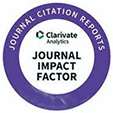DETERMINATION OF RATE CONSTANT AND STABILITY OF ADSORPTION IN COMPETITIVE ADSORPTION OF Cr(III) AND Cd(II) ON HUMIC ACID BY USING THE NEW MODEL OF KINETIC FORMULATION
Suyanta Suyanta(1*), Sri Sudiono(2), Sri Juari Santosa(3)
(1) Chemistry Department, Faculty of Mathematics and Natural Sciences, Universitas Gadjah Mada, Yogyakarta
(2) Chemistry Department, Faculty of Mathematics and Natural Sciences, Universitas Gadjah Mada, Yogyakarta
(3) Chemistry Department, Faculty of Mathematics and Natural Sciences, Universitas Gadjah Mada, Yogyakarta
(*) Corresponding Author
Abstract
Determination of rate and stability constants of adsorption in competitive adsorption of Cr(III) and Cd(II) on humic acid by using the new model of kinetic formulation has been done. The new model based on assumption that those adsorption was first order adsorption rearched equilibrium.
Humic acid was isolated from Peat moss of Silaut- West Sumatra by modificated Schnitzer method. Humic acid characterization was conducted by using infrared spectrophotometer with KBR pellet method. The experiment of kinetic adsorption was conducted in batch system reactor using erlenmeyer at 25 ± 0.01 oC of water steam bath and in a series of sampling procedure. Initial concentration of both Cr(III) and Cd(II) was 4x10-4 M. Thirty milligrams of humic acid was added to 200 mL of metal solution, and then stirred continuously. At the fixed periode of time, 10 mL of sample was taken using a syringe, then filterd with 0.45 µm filter paper. Concentration of Cr(III) and Cd(II) in the filtrate was determinated by AAS, while that was adsorbed by humic acid was equal to difference between initial and equilibrium concentration.
It was concluded that competitive adsorption of Cr(III) and Cd(II) on humic acid was first order adsorption rearched equilibrium as proposed in this research. Adsorption rate constant of Cr(III) on humic acid at competitive condition was greater than of Cd(II), but on the contrary for stability constant (K). Competition between Cr(III) and Cd(II) to interact with the active side of humic acid was dominated by Cr(III).
Keywords
Full Text:
Full Text PdfReferences
[1] Gaffney, J.S., Marley, N.A., and Clack, S.B., 1996, Humic and Fulvic Acid : Isolation, Structure and Environmental Role, American Chemical Society, Washington, DC.
[2] Stevenson, F.J., 1994, Humic Chemistry : Genesis, Composition, Reactions, John Wiley & Sons. Inc, New York.
[3] Aiken, G.R., McKnight, D.M., Wershaw, R.I., and MacCarthy, P., 1985 Humic Substances in Soil, Sediment and Water : Geochemistry, Isolation, and Characterization, John Wiley & Sons, New York.
[4] Senesi, N., 1992, Metal-Humic Substances Complexes in the Environment. Moleculal and Mechanistic Aspects by Multiple Spectroscopic Approach, In Biogeochemistry of Trace Metal (Ed. D.C. Adriano).
[5] Jin, X., Bayley, G.W., Yu, S.Y. and Lynch, A.T., 1996, Soil Sci., 161 (8), 509-520.
[6] Santosa, S.J. dan Muzakky, 2002, Kinetika Adsorpsi Logam Berat (Krom, Tembaga, dan Uranium) oleh Asam Humat dalam Tanah Gambut, Laporan Penelitian Penelitian Dasar Tahun Anggaran 2002, Yogyakarta.
[7] Schinitzer, M., 1986, Pengikatan Bahan Humat Oleh Koloid Mineral Tanah, (dalam Huang, P.M., dan Schinizer, M., 1986, Interaksi Mineral Tanah dengan Organik Alami dan Mikrobia, Terjemahan Goenadi, D.H., 1997), Gadjah Mada University Press, Yogyakarta.
[8] Santosa, S.J., Narsito, and Sudiono, S., 2000, Study on the Copper Interaction with Humic Substances, A Preliminary Investigation in Assessing the Fate of Copper in Aquatic Environment Enriching Humic Substances, Research Report for the Project Grant 1999/2000 QUE Project, Chemistry Study Program, Gadjah Mada University, Yogyakarta.
[9] Stevenson, F.J. and Goh, K.M., 1972, Soil Sci., 113, 334-345.
Article Metrics
Copyright (c) 2010 Indonesian Journal of Chemistry

This work is licensed under a Creative Commons Attribution-NonCommercial-NoDerivatives 4.0 International License.
Indonesian Journal of Chemistry (ISSN 1411-9420 /e-ISSN 2460-1578) - Chemistry Department, Universitas Gadjah Mada, Indonesia.












